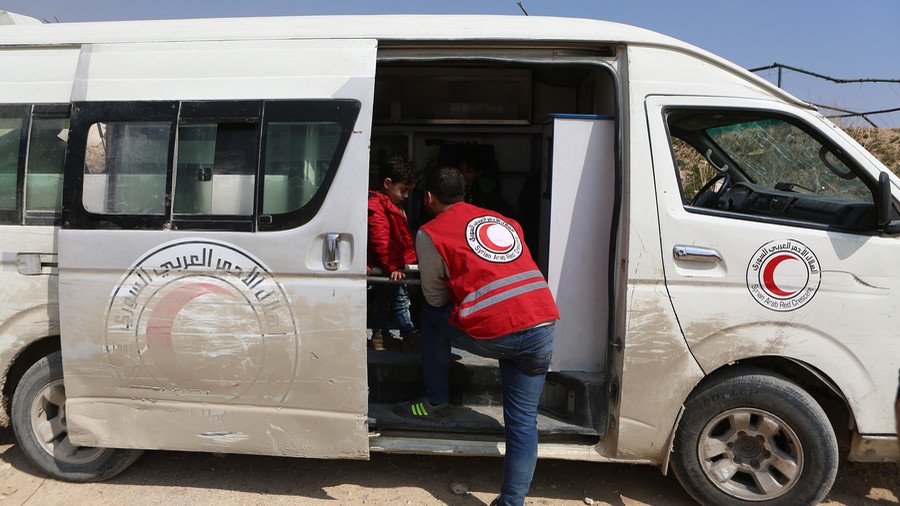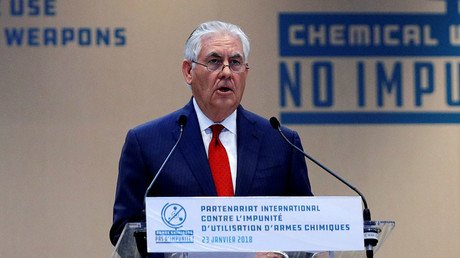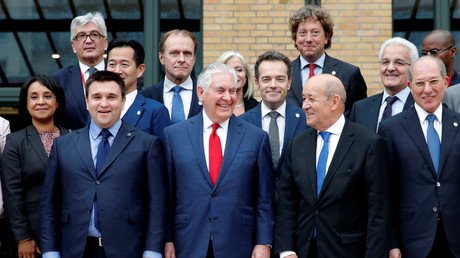Red Crescent says it found no trace of ‘Ghouta chem attack’ used by US to blame Damascus & Moscow

A former US secretary of state said Moscow was “ultimately responsible” for all chemical incidents in Syria, after reports of a chlorine attack in Ghouta in January. Now, the Syrian Red Crescent says there was no such attack.
The medical specialists, who have worked in the Damascus suburb of Ghouta for years, told journalists they did not see any evidence of any chemical incident taking place in the area in January. They also did not confirm reports about an alleged chlorine gas attack that, supposedly, affected more than 20 civilians on January 22.
"At some point, our [hospital] received six people, who were allegedly suffering from respiratory problems. Following a medical examination, we did not find any problems at all, any traces of chemical agents," Seif Aldin Hobia, a member of the Syrian Arab Red Crescent, who worked for the last seven years at the central hospital of Douma in Eastern Ghouta, said. Recalling the events that took place in January, he added: "we had no evidence of chemical agents being used [in the area]."
His words were echoed by another medical specialist from the Syrian Arab Red Crescent, Muhammad Adnan Tabazhu, who claimed that the medics obtained no evidence of chemical weapons being used in Eastern Ghouta between 2012 and 2018, when he was working in the area.
The Syrian Arab Red Crescent (SARC) is a local humanitarian NGO that says it “enjoys financial and administrative independence.” The organization was established in 1942 and recognized by the International Committee of the Red Cross in Geneva (ICRC) in 1946. It has a headquarters in Damascus. The ICRC says it actively cooperates with the SARC in its humanitarian operations across Syria.
Back in January, former Secretary of State Rex Tillerson famously claimed that "more than 20 civilians, mostly children, were victims of an apparent chlorine gas attack," adding that the incident raised "serious concerns that [Syrian President] Bashar al-Assad may be continuing to use chemical weapons against his own people."
‘Syria gases own people just as Trump mulls withdrawal?’ Journalists question Douma ‘chem attack’
He then immediately said that "whoever conducted the attacks, Russia ultimately bears responsibility for the victims in Eastern Ghouta and countless other Syrians targeted with chemical weapons since Russia became involved in Syria."
The timing of the incident conspicuously coincided with a 29-nation conference in Paris, organized to create the 'International Partnership against Impunity for the Use of Chemical Weapons.' The reports about the ‘attack’ came just a day ahead of the meeting. The claims were produced by controversial sources, namely the White Helmets and the UK-based Syrian Observatory for Human Rights (SOHR).
Moscow at the time slammed the US accusations as a "massive propaganda attack conducted with the purpose of slandering Russia on the world stage and undermining efforts for a peaceful settlement in Syria." Back then, Russia also called an emergency UN Security Council meeting to discuss the allegations of the use of chemical weapons in Syria.
In early February, Pentagon chief James Mattis admitted that the US had no evidence of such chemical agents as sarin ever being used by the Syrian government at all. He also openly said that the only information the US had been able to obtain, so far, had come from "other groups on the ground, NGOs, fighters on the ground" and just "people who claim it's been used."
Mattis, however, claimed that it was "clear" that Damascus had used chlorine gas in the Syrian conflict but, as before, failed to provide any evidence to substantiate his claims. Reports of chemical attacks, blamed on Damascus, had repeatedly surfaced earlier, with Western media and officials immediately jumping at the opportunity to put all the blame for such incidents on the Syrian government and Moscow, often only to admit later that they actually had no verifiable evidence that the attacks in question had even taken place.
The latest revelations come amid another wave of hysteria that followed yet another claim made by the same controversial pro-militant sources that, once again, have accused Damascus of carrying out a chemical attack in the town of Douma on Saturday. Syria and Russia dismissed all the accusations and called the reports fake news and propaganda, which were aimed at helping the extremists and justifying potential strikes against Syrian forces.
EDITORIAL NOTE: This story has been amended to better reflect the fact that it represents the statements of the Syrian Red Crescent NGO. The text lacked attribution when describing the alleged chemical attack in Syria’s Ghouta in January as something that never happened.
If you like this story, share it with a friend!
















